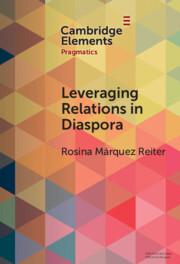Element contents
Leveraging Relations in Diaspora
Published online by Cambridge University Press: 14 February 2024
Summary
Keywords
Information
- Type
- Element
- Information
- Series: Elements in PragmaticsOnline ISBN: 9781009206617Publisher: Cambridge University PressPrint publication: 14 March 2024
References
Accessibility standard: Unknown
Why this information is here
This section outlines the accessibility features of this content - including support for screen readers, full keyboard navigation and high-contrast display options. This may not be relevant for you.Accessibility Information
- 4
- Cited by
